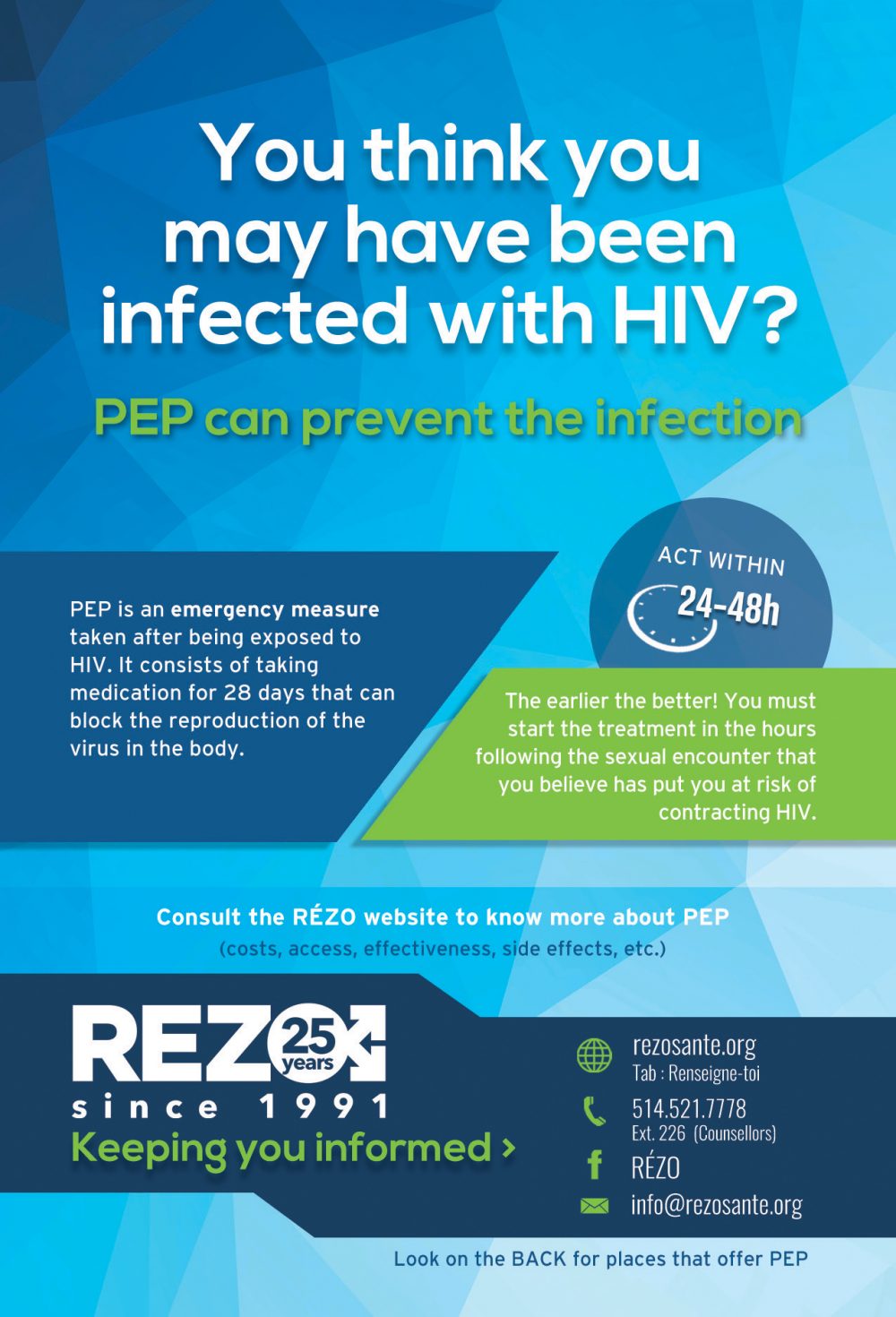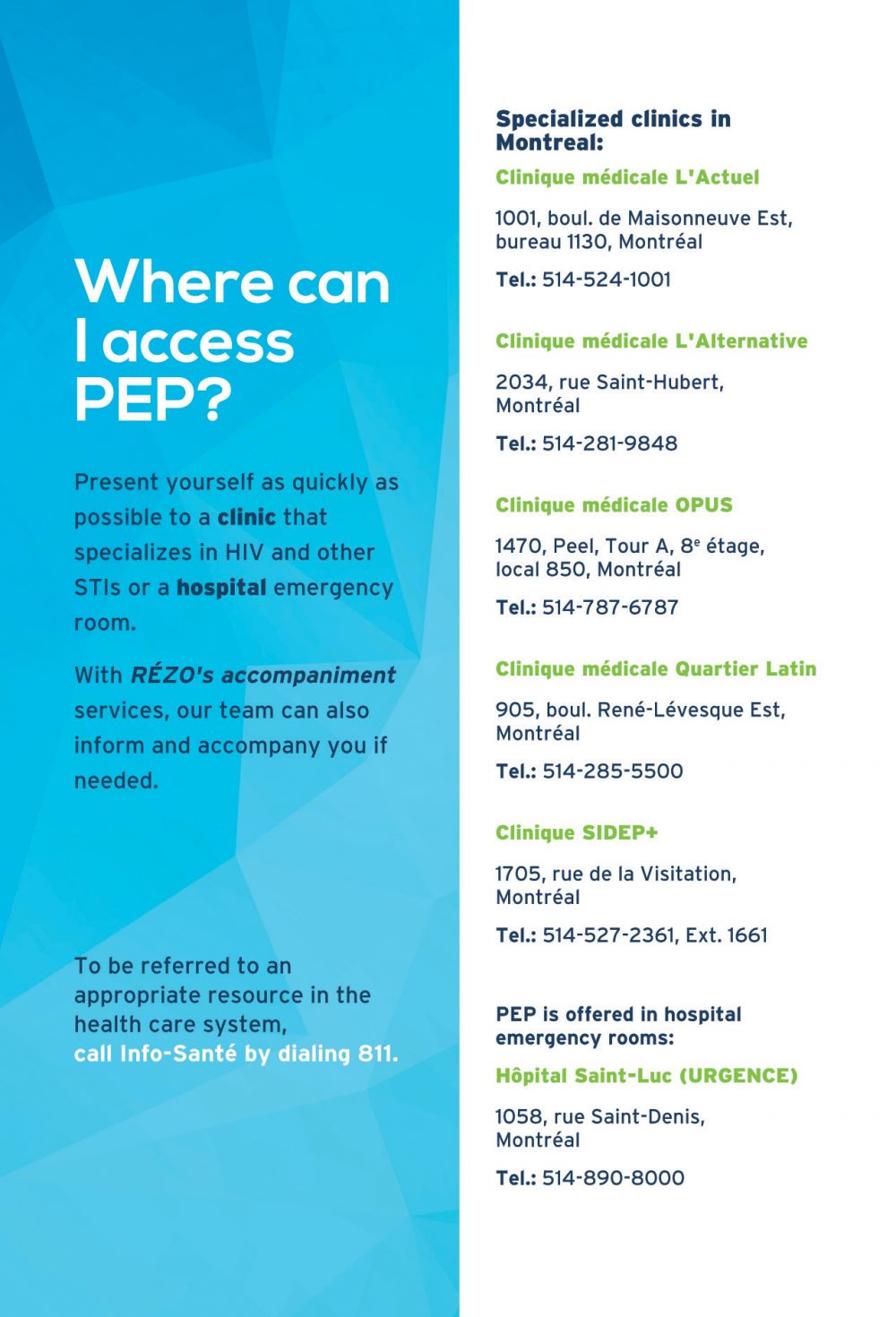PEP is the acronym for Post-Exposure Prophylaxis. In French, PPE is the acronym used for prophylaxie postexposition.
PEP is an emergency measure taken by an HIV negative person to prevent an HIV infection after an exposure to the virus. How? By taking antiretroviral medications for 28 consecutive days, beginning in the hours following a risky sexual encounter (up to a maximum of 72 hours). Very early administration of PEP reduces the risk of the HIV virus multiplying in the body.
Under what circumstances is a PEP preventive medicine appropriate?
For HIV negative people who may have been exposed to HIV during a risky sexual encounter. An encounter with penetration is considered risky when, for example, a condom was not used for the entirety or for part of a penetration, no matter how long the duration. The use of a sex toy that was also used by your partner can also pose a risk of exposure. In certain situations, oral sex with ejaculation is also considered a risk. Those who use injection material (needles) or medical personnel can also access PEP.
PEP can be prescribed for when a condom has broken during anal sex or when a man has unprotected anal sex with an HIV positive partner or with a partner whose status they aren’t aware of. Medical professionals will evaluate the possible risks of infection of HIV and the pertinence of prescribing PEP.
Can you avoid an HIV infection after possibly being exposed to it?
The condom broke during your last sexual encounter? You were lost in the moment and forgot to use protection with a partner whose HIV status you don’t know? You were engaged in activities that are high risk for an HIV infection (sharing needles, etc.)? For these situations, there exists an HIV prevention method called Post-Exposure Prophylaxis or PEP.
Why act quickly when taking PEP?
When taking PEP, the earlier you begin the better. Studies have shown that the earlier PEP is taken after an exposure to the virus, the higher the chances are to prevent an infection. The most ideal is to begin within 2 hours of an exposure. After 72 hours, studies have shown that it is no longer beneficial to take antiretroviral medications to prevent an infection. During the first three days (the first 72 hours), the virus is present only in the blood, where antiretroviral medications can more easily fight it. Beyond these three days, the virus can reach and embed itself in different parts of your body. After that, it is more difficult to fight.
What happens during an evaluation for PEP?
During your first visit, a medical professional will evaluate with you the necessity of administering PEP. For that, they will determine:
- Your current HIV status by offering you a rapid HIV test. If the result is positive, PEP will not be prescribed;
- When possible, the HIV status of the person with whom you had the sexual encounter (which must be either HIV positive or unknown);
- If the person is HIV positive, it’s possible that the following will also checked: their viral load, any viral resistances that they may have, and the antiretroviral medication that they are currently taking;
- The amount of time since the risky sexual encounter (keep in mind, the evaluation must happen within 72 hours of the exposure – ideally within 2 hours. Any later than that, PEP will not be prescribed);
- The level of possible risk: situations that lead to a high risk of exposure are often unprotected anal or vaginal penetration or by the sharing of injection materials.
Where can I access PEP?
To access PEP in Quebec, go directly to a hospital emergency room or a specialized clinic able to offer PEP. With RÉZO’s accompaniment services, the outreach workers can counsel and accompany you when needed.
To be directed to an appropriate service in the health care system, call Info-Santé by dialing 811.
Specialized clinics in Montreal:
What does PEP consists of and how does it work?
A PEP preventive medicine consists of regularly taking antiretroviral medications for 28 days (4 weeks) with a medical follow-up for the possible side-effects the medication may have on your body.
The preventive medicine is a combination therapy (2 pills where one is a combination of two medications and the other is only one medication). These antiretroviral medications is designed to fight the multiplication of the virus in the blood system. The antiretrovirals administered in the context of PEP are generally the same which are used in the treatment taken by an HIV positive person.
By taking the medicine in a strict manner, every day and by following the schedule prescribed by the doctor, the medications will stay highly concentrated in the blood system during the 28 days of the treatment, therefore effectively fighting the virus to avoid an infection. It is important to know that a PEP preventive medicine offers a solution, but is not without certain side effects on the body that can be hard to endure during the 28 day medicine. Read more about this below under the section “What are the side effects of PEP?”.
A take-home kit may be given by the medical staff. It contains medication for 3 days and a prescription for 4 days of medicine, which will be prolonged after a second appointment with the physician. Not all establishments will necessarily give a take-home kit and may prescribe directly 28 days. The first pills are to be taken (with or without food) as early as possible.
The follow-up for a PEP is generally done over 6 appointments. As mentioned above, the first appointment consists of an evaluation for the pertinence of prescribing PEP. You will return to see the physician for a second and third appointment, 2 and 4 weeks after the first visit, to follow-up on any possible side-effects that you may experience after beginning your medication. At each appointment, the medication may be adjusted, continued or stopped, depending on how your body responds to the medicine. The other appointments consist of an HIV test, done by a blood sample, taken at 6 weeks, 3 months and 6 months after the possible exposure to HIV.
How effective is PEP?
As much as PEP reduces the chance of contracting HIV, this preventive medicine is not absolute. We know that the earlier the medication is started and the more strictly a person follows their medicine, the better the chances of success. So, if during the 28 days you follow the instructions correctly for your preventive antiretroviral medicine, the medication will stay adequately concentrated in the blood to fight the virus. Therefore, it is important to take the medications daily and on a strict basis to ensure the effectiveness of the medicine.
Given that PEP is not 100% guaranteed to be effective, it is asked that those following a PEP preventive medicine try to avoid sexual encounters or use condoms during all sexual encounters during the 3 months following the possible exposure to HIV.
What will happen if I don’t properly follow the prescription?
In a situation where you may forget or don’t respect the prescribed dosage, the concentration of antiretrovirals in the blood risk being at an insufficient amount to stop the infection of HIV, allowing the virus to multiply and infect the person. Therefore it is essential to remember the importance of not missing any doses and to take the medicine for the entire period of time that it is prescribed.
What are the side-effects of PEP?
Once a physician prescribes PEP, they will explain the possible side effects you may experience. Most of these side-effects are temporary and will go away on their own, but some must be evaluated by a physician. It is important to discuss side effects with a health professional.
These side-effects may occur when taking PEP: fatigue, vomiting, diarrhea, head-aches, dizziness, loss of appetite. There exist some solutions to ease these effects. You can discuss these with the medical professionals, if needed.
The side-effects will stop once the medication is finished.
How much does PEP cost?
The price of a PEP medicine (28 days) is around $1 500 to $2000. The price varies depending on the type of medicine.
The medicine is covered by the Régie d’assurance medicaments du Québec (RAMQ), which makes the maximum contribution by people covered around 95,31$ (price subject to change without notice).
Those covered by private insurance must enquire with their insurance company to know the amount that may be covered, which can vary from company to company. Some may require that you pay the full amount before being reimbursed.
Would you like to speak about a certain situation and PEP with one of RÉZO’s outreach workers?
Remember that if you think you may need PEP, it is important to not waste time and to act quickly by going to a clinic or a hospital emergency room, as mentioned above. If you have any doubts or questions, don’t hesitate and contact us!


More questions?
Source material consulted for this article and complimentary information: